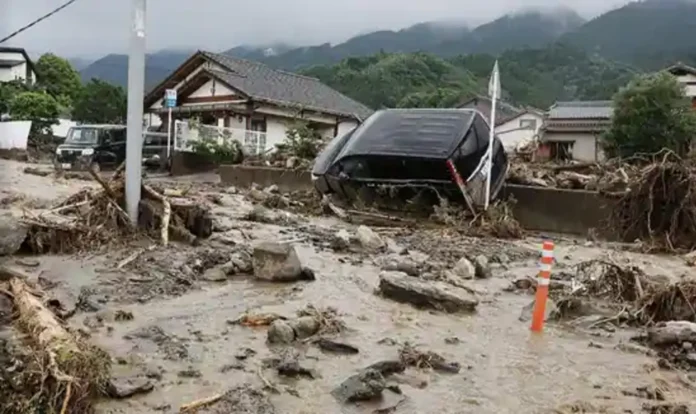In the wake of torrential rain that engulfed Japan’s southwestern island of Kyushu, the region faced devastating floods and landslides, resulting in the loss of several lives and leaving rescue teams in search of missing individuals. The Japan Meteorological Agency, which had previously issued special warnings for heavy rains in northern parts of the island, downgraded them to lower-level warnings and advisories. Nevertheless, authorities advised residents to remain vigilant against potential landslides. Japan joins the growing list of countries worldwide grappling with unusually heavy rainfall in recent days, fueling concerns about the escalating impact of climate change.
The downpours have amplified fears surrounding the accelerating pace of global warming. At a regular news conference, Chief Cabinet Secretary Hirokazu Matsuno revealed that while municipalities were still assessing the full extent of the casualties, three deaths had been confirmed, with an additional three potentially linked to the disaster. Three individuals were reported missing, while two sustained minor injuries. The heavy rainfall compelled tire manufacturer Bridgestone to halt operations at four factories on Kyushu temporarily.
However, by Tuesday morning, the plants had resumed their activities, as confirmed by a company spokesperson. The devastating consequences of the extreme weather events on Kyushu emphasize the urgent need for proactive measures against the impacts of climate change. Scientists and experts worldwide have been warning about the intensification of extreme weather patterns, with heavy rainfall being one of the prominent manifestations. The situation in Kyushu highlights the vulnerability of regions to flash floods and landslides, which can lead to loss of life, property damage, and disruptions to industries.
As climate change continues to influence global weather patterns, it becomes crucial for governments and communities to enhance their preparedness and resilience. This entails investing in advanced early warning systems, improving infrastructure to mitigate the impacts of heavy rainfall, and implementing sustainable practices to curb greenhouse gas emissions. The recent events in Japan serve as a reminder that climate change is a global challenge that requires collective efforts to mitigate its effects. The world must prioritize collaborative action to limit the exacerbation of extreme weather events and safeguard the lives and well-being of communities susceptible to their devastating consequences.


